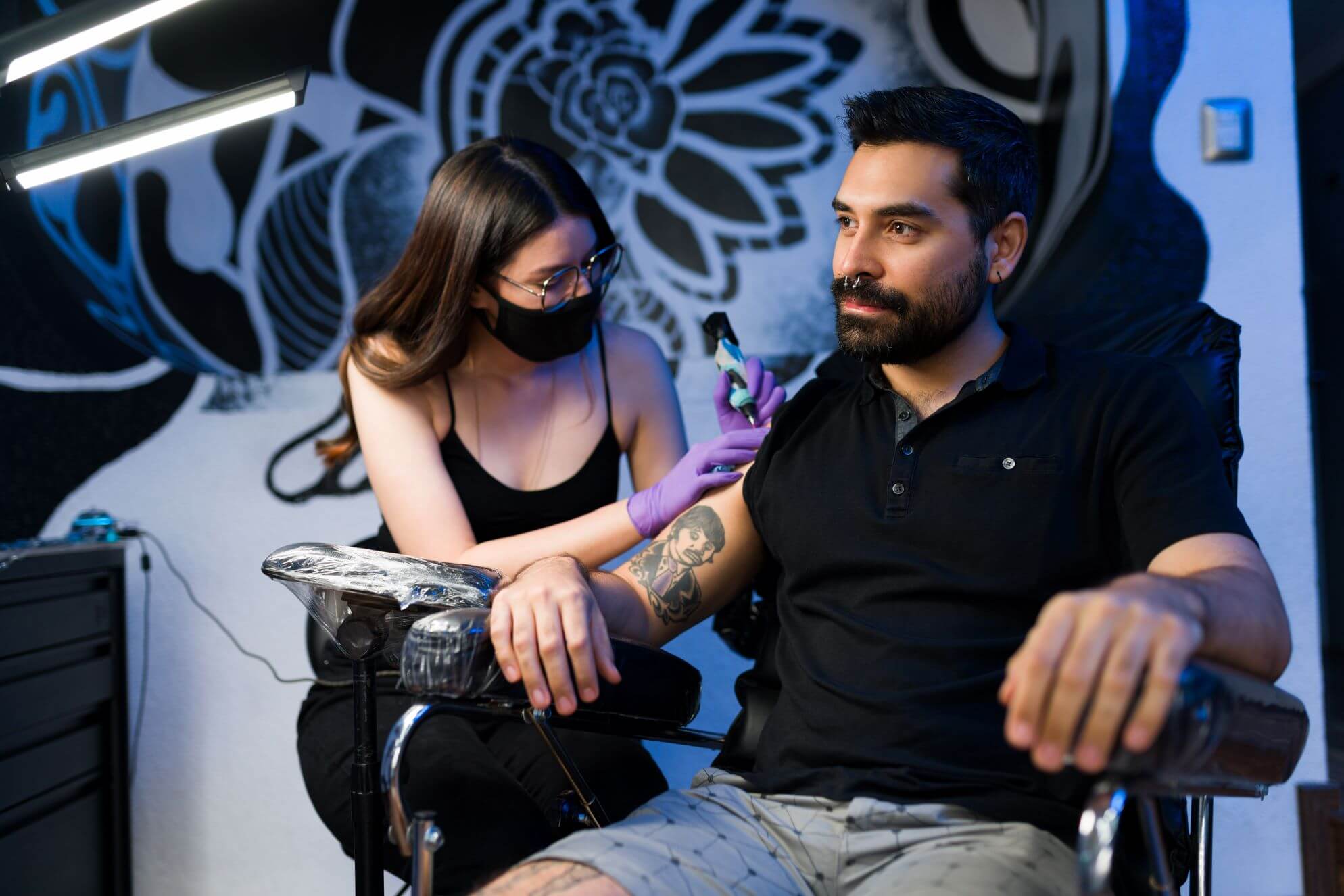Tattoos are a great way to show your personality and creativity, but for those who have a chronic skin condition like psoriasis, getting a tattoo may come with added risks. According to Dr. John “Jay” Wofford of U.S. Dermatology Partners in Dallas and Plano, Texas, “When my psoriasis patients tell me they’re thinking about getting a tattoo, I always want to carefully talk through where they’re getting the tattoo, how to care for the area as it heals, and potential risks. The decision for a psoriasis patient to get a tattoo shouldn’t be undertaken lightly, but it is possible with the right guidance and skincare plan.” In this blog, Dr. Wofford talks through everything you need to know about psoriasis and tattoos, including risks, aftercare, and other considerations you should think through before investing in your tattoo.
Risks Associated with Getting a Tattoo with Psoriasis
According to Dr. Wofford, “Infection is one of the most serious risks associated with tattooing, so it’s important to hold off on getting a tattoo if you’re receiving immunosuppression therapy to treat psoriasis. There are also other risks that should be considered carefully before moving forward with a tattoo.”
Some of the other possible risks associated with tattooing for psoriasis patients include:
- Increased risk for psoriasis flare – Following tattooing, a small percentage of people can develop psoriasis plaques for the first time. Those who already have psoriasis may experience a flare at the tattoo site after receiving their tattoo. They are also at increased risk for flares throughout the healing process.
- Allergic response – Some people can have an allergic response to the dyes used in tattoos, but this risk may be higher for those with psoriasis. Additionally, this allergic response can be more severe for those with psoriasis, and it may also trigger a flare.
- Scar formation – Tattoos do not usually cause scarring. Scar tissue typically develops when the deeper layers of skin are damaged, and the body isn’t able to heal the skin fully. Tattoos usually only damage the superficial layers of skin, which can heal without scarring. However, those with psoriasis may be at greater risk for scarring from tattoos because psoriasis can trigger immune system overaction, leading to scar tissue development.
How to Care for a Tattoo with Psoriasis
To mitigate skin health risks related to tattooing, Dr. Wofford says, “Work with your dermatologist prior to getting a tattoo to ensure you have the best aftercare instructions. Your tattoo artist will likely provide a treatment plan as well, but only a dermatologist truly understands what products are best suited for psoriasis-prone skin and how to use them to promote skin healing and prevent risks associated with tattoos. The main skincare tip from most tattoo artists is to use a healing ointment to protect and hydrate the tattoo. Your dermatologist will likely recommend the same. One of my personal favorite healing products for post-tattoo care is the Avene Cicalfate+ Restorative Protective Cream. This skincare product offers a rich, nourishing moisturizer without any unnecessary ingredients. It shields and hydrates skin, which is great for healing, and it promotes the restoration of the skin’s natural protective barrier.”
In addition to keeping skin hydrated throughout the healing process, the following preventive measures can minimize the risks associated with tattooing psoriasis-prone skin:
- Keep the area around your tattoo clean to minimize the risk of infection. Use a gentle, non-irritating cleanser, and make sure to thoroughly rinse the skin as soap residue may cause irritation.
- Wear light, loose clothing to avoid mechanically irritating or damaging skin as it heals.
- Avoid sunlight as the tattoo heals or keep the tattoo site covered. At the very least, apply sunscreen to the tattoo site if exposed to the sun.
- Skip the pool. Chlorine in pool water can negatively impact skin healing following tattooing.
- As the tattoo site heals, you may notice some scabbing, which is natural. Don’t pick or scratch at the scabs, as this can delay healing and increase the risk of infection.
Considerations for Those with Psoriasis Who Wish to Get a Tattoo
One of the top considerations prior to getting a tattoo should be the conditions of the facility where the tattoo is being provided. Cleanliness is essential to avoid infection. According to Dr. Wofford, “Before you receive a tattoo, you should vet the tattoo artist and facilities to assess their cleaning and sanitation practices, as well as their skills and experience. It’s important to choose a tattoo studio that follows best practices.” Before choosing a tattoo studio, take time to ask the artist a few questions, including:
- Are you open to providing tattoos for people with psoriasis, and have you ever provided a tattoo for someone with psoriasis before? As worried as you are about receiving a tattoo, keep in mind that some tattoo artists may not be comfortable tattooing people with psoriasis because of the risks. If you can find someone who has tattooed people with psoriasis in the past, that can be extremely beneficial.
- What is your experience? The longer someone has been providing tattoos the more likely they are to provide a tattoo safely. In addition to asking about their experience, you may also want to take a look at some of their previous work.
- What are your sanitation practices? You should ask how the tools and facility are cleaned and sanitized. You should also find out about hygiene practices for the tattoo artist and any other employees. Your tattoo artist should always wash their hands, wear gloves, and sanitize your skin before beginning the tattoo.
In addition to asking the tattoo artist directly about their experience and sanitation practices, you can also check for reviews from past clients who have visited the tattoo parlor. This gives perspective on how others perceive the tattoo artist and their facilities.
Want to Discuss Tattooing with an Expert?
Your tattoo artist might be the expert in providing beautiful body art, but only your dermatologist has the expertise to help you understand how tattoos will impact your skin health. According to a recent study, less than 10% of psoriasis patients sought advice from their dermatologist or other medical professionals before receiving a tattoo. Before you commit to a tattoo, schedule an appointment to talk it through with a dermatologist. U.S. Dermatology Partners makes it quick and easy to set up your consultation visit. Just take a few minutes to complete our online scheduling request. Once we hear from you, a local team member will reach out to finalize the details of your visit.
Find a location near me
or


